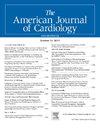血压管理对家族性高胆固醇血症患者心血管事件的影响:家族性高胆固醇血症患者中的高血压
IF 2.3
3区 医学
Q2 CARDIAC & CARDIOVASCULAR SYSTEMS
引用次数: 0
摘要
高血压与家族性高胆固醇血症(FH)患者的不良预后有关。我们旨在确定血压管理对心血管事件发展的临床影响。我们对临床诊断为杂合性 FH(HeFH)的患者(人数=1,273,男性/女性=614/659)进行了血压数据评估。我们将他们分为四组(第 1 组:从基线到随访期间均无高血压的患者;第 2 组:基线时无高血压,但随访时出现高血压的患者;第 3 组:基线时有高血压,但随访时血压控制良好的患者;第 4 组:基线时有高血压,但随访时血压未得到控制的患者)。我们使用 Cox 比例危险模型来评估与心血管事件(包括心血管死亡和任何冠状动脉事件)相关的因素。随访时间的中位数为 10.9 年。我们在随访期间观察到 142 起心血管事件,结果显示,血压管理与心血管事件的发生显著相关(危险比 [HR]:2.50,95% 置信区间 [CI]:1.30-3.70,P<0.05):1.30-3.70,p <0.001;HR:4.18,95% 置信区间:2.08-6.28,p <0.001;HR:10.96,95% 置信区间:6.10-17.58,p <0.001,分别在第 2、3 和 4 组,以第 1 组为参照)。总之,血压管理对 HeFH 患者至关重要。本文章由计算机程序翻译,如有差异,请以英文原文为准。
Impact of Blood Pressure Management on Cardiovascular Events in Patients With Familial Hypercholesterolemia
Hypertension has been associated with worse outcomes in patients with familial hypercholesterolemia (FH). We aimed to identify the clinical impact of blood pressure management on the development of cardiovascular events. We assessed patients with clinically diagnosed heterozygous FH (n = 1,273, male/female = 614/659) with blood pressure data. We categorized them into 4 groups (group 1: patients without hypertension from baseline to follow-up; group 2: patients without hypertension at baseline but in whom hypertension developed at follow-up; group 3: patients with hypertension at baseline that was well-controlled at follow-up; group 4: patients with hypertension from baseline that was uncontrolled at follow-up). We used Cox proportional hazards models to evaluate factors associated with cardiovascular events, including cardiovascular death and any coronary events. The median follow-up period was 10.9 years. We observed 142 cardiovascular events during the follow-up period and revealed that blood pressure management was significantly associated with cardiovascular event occurrence (hazard ratio [HR] 2.50, 95% confidence interval [CI] 1.30 to 3.70, p <0.001; HR 4.18, 95% CI 2.08 to 6.28, p <0.001; HR 10.96, 95% CI 6.10 to 17.58, p <0.001 in groups 2, 3, and 4, respectively, with group 1 as reference). In conclusion, blood pressure management is crucial in patients with heterozygous FH.
求助全文
通过发布文献求助,成功后即可免费获取论文全文。
去求助
来源期刊

American Journal of Cardiology
医学-心血管系统
CiteScore
4.00
自引率
3.60%
发文量
698
审稿时长
33 days
期刊介绍:
Published 24 times a year, The American Journal of Cardiology® is an independent journal designed for cardiovascular disease specialists and internists with a subspecialty in cardiology throughout the world. AJC is an independent, scientific, peer-reviewed journal of original articles that focus on the practical, clinical approach to the diagnosis and treatment of cardiovascular disease. AJC has one of the fastest acceptance to publication times in Cardiology. Features report on systemic hypertension, methodology, drugs, pacing, arrhythmia, preventive cardiology, congestive heart failure, valvular heart disease, congenital heart disease, and cardiomyopathy. Also included are editorials, readers'' comments, and symposia.
 求助内容:
求助内容: 应助结果提醒方式:
应助结果提醒方式:


